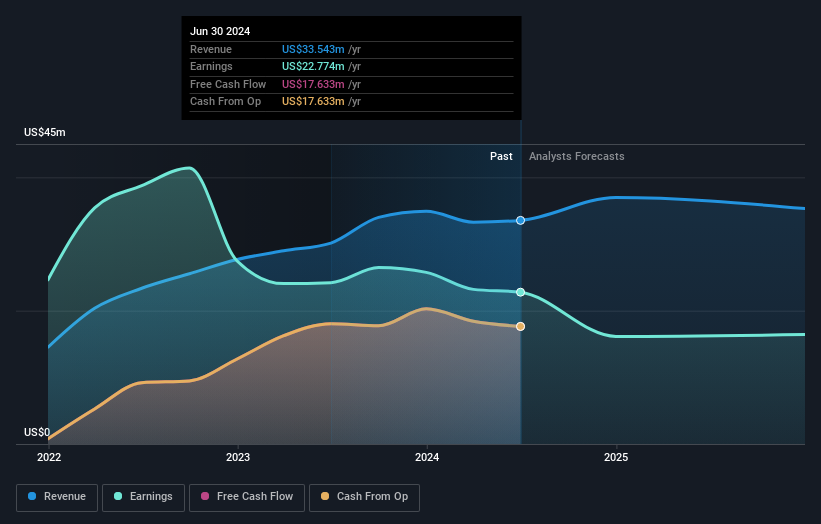Institutions along with retail investors who hold considerable shares inSeven Hills Realty Trust (NASDAQ:SEVN) come under pressure; lose 12% of holdings value
Key Insights
- The considerable ownership by retail investors in Seven Hills Realty Trust indicates that they collectively have a greater say in management and business strategy
- The top 25 shareholders own 43% of the company
- 43% of Seven Hills Realty Trust is held by Institutions
A look at the shareholders of Seven Hills Realty Trust (NASDAQ:SEVN) can tell us which group is most powerful. The group holding the most number of shares in the company, around 55% to be precise, is retail investors. That is, the group stands to benefit the most if the stock rises (or lose the most if there is a downturn).
While the holdings of retail investors took a hit after last week’s 12% price drop, institutions with their 43% holdings also suffered.
Let's take a closer look to see what the different types of shareholders can tell us about Seven Hills Realty Trust.
Check out our latest analysis for Seven Hills Realty Trust

What Does The Institutional Ownership Tell Us About Seven Hills Realty Trust?
Institutions typically measure themselves against a benchmark when reporting to their own investors, so they often become more enthusiastic about a stock once it's included in a major index. We would expect most companies to have some institutions on the register, especially if they are growing.
As you can see, institutional investors have a fair amount of stake in Seven Hills Realty Trust. This can indicate that the company has a certain degree of credibility in the investment community. However, it is best to be wary of relying on the supposed validation that comes with institutional investors. They too, get it wrong sometimes. It is not uncommon to see a big share price drop if two large institutional investors try to sell out of a stock at the same time. So it is worth checking the past earnings trajectory of Seven Hills Realty Trust, (below). Of course, keep in mind that there are other factors to consider, too.

Hedge funds don't have many shares in Seven Hills Realty Trust. Tremont Realty Management, LLC is currently the company's largest shareholder with 12% of shares outstanding. Meanwhile, the second and third largest shareholders, hold 6.9% and 5.1%, of the shares outstanding, respectively.
Our studies suggest that the top 25 shareholders collectively control less than half of the company's shares, meaning that the company's shares are widely disseminated and there is no dominant shareholder.
While it makes sense to study institutional ownership data for a company, it also makes sense to study analyst sentiments to know which way the wind is blowing. While there is some analyst coverage, the company is probably not widely covered. So it could gain more attention, down the track.
Insider Ownership Of Seven Hills Realty Trust
The definition of an insider can differ slightly between different countries, but members of the board of directors always count. Management ultimately answers to the board. However, it is not uncommon for managers to be executive board members, especially if they are a founder or the CEO.
Insider ownership is positive when it signals leadership are thinking like the true owners of the company. However, high insider ownership can also give immense power to a small group within the company. This can be negative in some circumstances.
Our most recent data indicates that insiders own some shares in Seven Hills Realty Trust. It has a market capitalization of just US$201m, and insiders have US$5.6m worth of shares, in their own names. It is good to see some investment by insiders, but it might be worth checking if those insiders have been buying.
General Public Ownership
The general public -- including retail investors -- own 55% of Seven Hills Realty Trust. This size of ownership gives investors from the general public some collective power. They can and probably do influence decisions on executive compensation, dividend policies and proposed business acquisitions.
Next Steps:
I find it very interesting to look at who exactly owns a company. But to truly gain insight, we need to consider other information, too. Like risks, for instance. Every company has them, and we've spotted 3 warning signs for Seven Hills Realty Trust (of which 2 are significant!) you should know about.
Ultimately the future is most important. You can access this free report on analyst forecasts for the company.
NB: Figures in this article are calculated using data from the last twelve months, which refer to the 12-month period ending on the last date of the month the financial statement is dated. This may not be consistent with full year annual report figures.
New: Manage All Your Stock Portfolios in One Place
We've created the ultimate portfolio companion for stock investors, and it's free.
• Connect an unlimited number of Portfolios and see your total in one currency• Be alerted to new Warning Signs or Risks via email or mobile• Track the Fair Value of your stocks
Try a Demo Portfolio for FreeHave feedback on this article? Concerned about the content? Get in touch with us directly. Alternatively, email editorial-team (at) simplywallst.com.This article by Simply Wall St is general in nature. We provide commentary based on historical data and analyst forecasts only using an unbiased methodology and our articles are not intended to be financial advice. It does not constitute a recommendation to buy or sell any stock, and does not take account of your objectives, or your financial situation. We aim to bring you long-term focused analysis driven by fundamental data. Note that our analysis may not factor in the latest price-sensitive company announcements or qualitative material. Simply Wall St has no position in any stocks mentioned.
免責聲明:投資有風險,本文並非投資建議,以上內容不應被視為任何金融產品的購買或出售要約、建議或邀請,作者或其他用戶的任何相關討論、評論或帖子也不應被視為此類內容。本文僅供一般參考,不考慮您的個人投資目標、財務狀況或需求。TTM對信息的準確性和完整性不承擔任何責任或保證,投資者應自行研究並在投資前尋求專業建議。
熱議股票
- 1
- 2
- 3
- 4
- 5
- 6
- 7
- 8
- 9
- 10